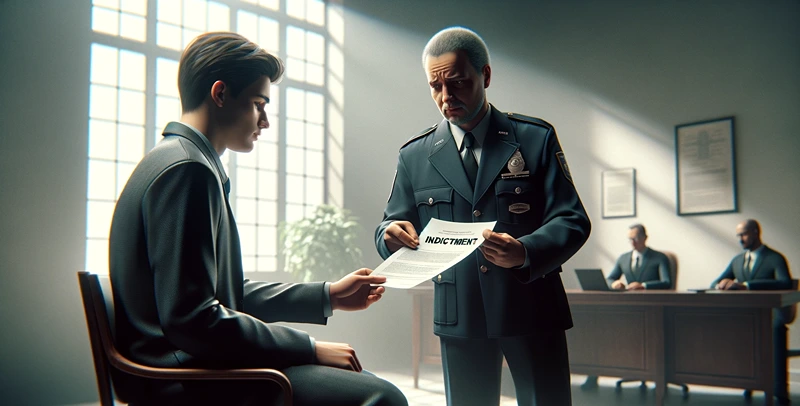
Feature Article: Understanding the Nine Stages of a Criminal Case in Arizona Law
Getting involved in a criminal case is a serious matter that requires immediate and thorough attention. When an individual is charged with a criminal offense, one of the first legal terms they may hear is "indictment."
So, what is a criminal indictment, and how does it work in Arizona law? In this feature article, we'll not only answer those questions but also discuss the nine stages of a criminal case in Arizona law.
What is a Criminal Indictment?
A criminal indictment is a formal accusation from a grand jury charging an individual with a criminal offense; it's a crucial step in the legal process. Prosecutors must obtain an indictment from the grand jury to proceed with a criminal case past the initial arrest and booking stage.
The Nine Stages of a Criminal Case in Arizona Law
Stage One: Arrest
The first stage of a criminal case is an arrest. When an individual is arrested in Arizona, law enforcement officers must read the individual their Miranda rights and tell them what charges they're facing. After arrest, the individual is then taken to a location where they'll receive a more complete explanation of their charges.
Stage Two: Initial Appearance
The second stage of a criminal case is the initial appearance. An initial appearance is where a judge sets the defendant's release conditions. In Arizona, the defendant is brought before a judge within 24 hours of the arrest.
Stage Three: Preliminary Hearing
The third stage is the preliminary hearing. During this stage, the prosecutor presents evidence and arguments to convince the judge that there is enough evidence to move forward with a criminal trial. The defendant has the right to cross-examine and present evidence to dispute the prosecutor's case.
Stage Four: Arraignment
The fourth stage is the arraignment, where the defendant enters a plea, such as guilty or not guilty. The judge also sets the trial date and deadlines for discovery and pre-trial motions.
Stage Five: Pre-Trial Motions
The fifth stage of a criminal case is pre-trial motions. This is where the defense attorney can argue that some evidence should be excluded from the trial because it was obtained illegally, for example. The prosecutor and defense attorney also discuss plea bargains.
Stage Six: Trial
The sixth stage is the trial itself. The prosecutor must prove the defendant's guilt beyond a reasonable doubt. The defense presents their own evidence and cross-examines the prosecutor's witnesses. If the defendant is found guilty, the judge will sentence them; if they're found not guilty, the case is closed, and they're released.
Stage Seven: Sentencing
The seventh stage is sentencing. When the defendant pleads guilty or is found guilty at trial, the judge will sentence them. This hearing is where the judge decides what penalty the defendant will receive, such as probation, fines, or jail time.
Stage Eight: Appeal
The eighth stage is an appeal. After a conviction, the defendant can appeal their case to a higher court, arguing that errors in legal procedure or evidence led to an unfair trial.
Stage Nine: Post-Conviction Relief
The ninth and final stage is post-conviction relief. This stage allows the defendant to appeal their sentencing, even though they've already appealed the actual conviction.
Is an Indictment the Same Thing as Criminal Charges?
It's essential to note that an indictment is not the same thing as criminal charges. Instead, the indictment is just one step in the criminal justice process that leads to formal charges. While an indictment is a crucial step, in the end, the prosecutor is responsible for formally charging the defendant with a crime.
Can I Be Indicted Without Being Arrested First?
Yes, a defendant can be indicted without being arrested first. In cases such as white-collar crimes, the defendant may be unaware of a grand jury investigation until they receive an indictment. Other times, a prosecutor may choose not to arrest the defendant and instead send them a summons to appear in court to face the indictment.
How Do Grand Jury Proceedings Work?
The grand jury proceedings are held in secret, and the grand jury members must listen to the prosecutor's evidence and decide whether they should issue an indictment. The grand jury's decision requires a majority vote.
Should You Hire a Defense Attorney For a Criminal Indictment?
Defendants should always have legal counsel when facing criminal charges, including during the indictment process. A criminal defense attorney has knowledge and experience in criminal law and can provide advice on a defendant's rights and options. They can also represent the defendant during the indictment, bail, and arraignment hearings and help prepare the defendant's case.
Conclusion
The criminal justice system is a complex, ever-changing process that shouldn't be navigated alone. With a better understanding of the nine stages of a criminal case in Arizona law, defendants can better understand the legal process they're facing and make more informed decisions about their defense.
If you or someone you know is facing criminal charges in Arizona, contact Kolsrud Law Offices to discuss your legal options and receive experienced representation.


0 Comments